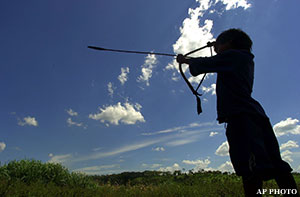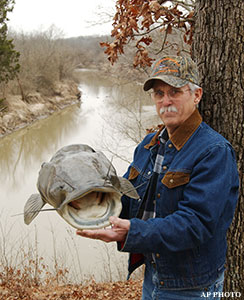
Forget those heat-seeking, laser-guided, GPS-enhanced rifles. Using high-tech gear like that can make just about anybody a successful hunter. But it also strips away the fun and challenge that hunters are craving in the first place.
That's why, according to a Wall Street Journal report, there is a retro-chic movement among hunters to shift from space age to stone age in their approach. A growing number of hunters have started crafting their own weapons, such as spears and arrows with tips made from stones, and they have been effective enough to bag deer, coyotes, elk, wild boar and alligators.
As evidence of the increasing popularity for old-school hunting, the chief executive of Primitive Archer tells the Journal that his magazine's circulation is up 25 percent in the past five years, to roughly 30,000, at a time when many print publications have struggled to retain readership.
Although the low-tech approach gives the animals more of a sporting chance, it hasn't escaped criticism. The Humane Society is concerned that animals can be injured but do not die when struck with a primitive weapon. State governments are also not on board, with many banning the use of stone-tipped projectiles. Even in Montana, a state known for its rugged spirit, a state bill to legalize spear hunting died in committee. Massachusetts restricts spear hunting for eels, carp and sucker fish.

In Texas, there is a campaign to legalize hand fishing, which would allow you to reach into the water and wrestle the fish out with your hands. This technique, known as noodling, grabbing or hogging, is currently illegal and classified as a class C misdemeanor, with fines of up to $500.
Noodlers wade into the water, then reach into holes, hollow tree trunks and other underwater nooks to find the fish. The Journal spotlighted a 30-year-old outdoor enthusiast named Brady Knowlton, who raved about his experience of catching a 60-pound catfish by hand: Nothing beats "the heebie-jeebies you get underwater, in the dark, with this little sea monster biting you."
The opposition to the proposed noodling legislation comes from traditional rod-and-reel fishermen. They cite unfairness to the fish, which doesn't have a chance to swim away because it is being ambushed in their burrows. They are also concerned that widespread noodling could deplete the fish population in smaller lakes and rivers.
If the bill becomes law in Texas, it would still only be the 18th state to sanction hand fishing. Louisiana, Georgia and Oklahoma are among the states that allow it.
Hand fishing enthusiasts say that their technique, which Native Americans developed and passed along to settlers, is the purest form of fishing because of direct contact between man and fish.
There are subtle differences among hand fishers -- the glove vs. no-glove debate -- but one noodler tells the Journal that the key is getting a handle on the tail: "If you don't get that tail immobilized, I don't care how big or strong you are, you're not going to whip that fish."




